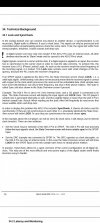I am super happy with my desktop Genelec 8331As + 7350. However, I have noticed something strange that I thought it would be worth sharing. I drive them purely with their AES digital input from an RME ADI-2 FS R (which has a nice AES digital output). So far, I have been feeding them data at whatever sample rate the audio file happened to come at (44.1/48/96/192/etc). They switch sample rates (little red flash of their leds) and it all seemed to work ok. Or rather, it seemed to work ok 99.9% of the time. I would hear occasional, but very real, audible clicks during playback. These clicks sound exactly clocking/sample errors.
The clicks were rare and did not seem to have a pattern I could discover. I could never reproduce them by e.g. replaying the same section of the file again. It was driving me nuts. Everything in the signal chain seemed ok and there should be ample headroom within the attenuated digital signal they received for any sample rate conversion without e.g. intersample overs.
Genelec say all their internal DSP and conversion works at 96kHz and 48kHz. My hypothesis was that there may be some subtle bug with clocking or converting other sample rates, or perhaps with tracking changes in sample rate of AES input.
I've now changed my signal chain so all audio that hits the Genelecs has been resampled to 96kHz -- they never see anything but 24/96 data now. So far (fingers crossed), the clicks have disappeared (and they still sound amazing, as always).
Does anyone else have a similar experience?
The clicks were rare and did not seem to have a pattern I could discover. I could never reproduce them by e.g. replaying the same section of the file again. It was driving me nuts. Everything in the signal chain seemed ok and there should be ample headroom within the attenuated digital signal they received for any sample rate conversion without e.g. intersample overs.
Genelec say all their internal DSP and conversion works at 96kHz and 48kHz. My hypothesis was that there may be some subtle bug with clocking or converting other sample rates, or perhaps with tracking changes in sample rate of AES input.
I've now changed my signal chain so all audio that hits the Genelecs has been resampled to 96kHz -- they never see anything but 24/96 data now. So far (fingers crossed), the clicks have disappeared (and they still sound amazing, as always).
Does anyone else have a similar experience?
